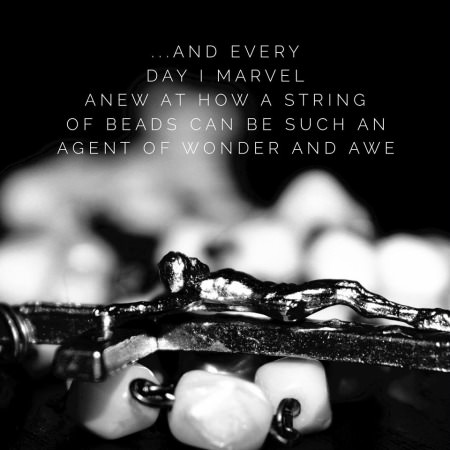 I was a child when my grandmother died, but I remember her wake vividly, and even now when I am in a hushed room I am again peering over the edge of her coffin and noting that she had the rosary with the blue beads rather than the rosary with the black beads. This was a surprise.
I was a child when my grandmother died, but I remember her wake vividly, and even now when I am in a hushed room I am again peering over the edge of her coffin and noting that she had the rosary with the blue beads rather than the rosary with the black beads. This was a surprise.
She had any number of rosaries but the rosary with the black beads was the workhorse, the favorite, the quotidian instrument; you might see the blue beads on days having particularly to do with the Madonna, and once a year, on the feast day of Saint Dorothea of Caesarea, she would haul out the wooden beads, because Dorothea was the patroness of fruit trees.
But you could tell that my grandmother was not comfortable with the wooden beads, because she would whip through the rosary at a wholly uncharacteristic speed. Usually she would march through the rosary so slowly, pronouncing each syllable as if for the first time ever, the words cut sharp and clean as if fresh from the prayer factory, that you could be inside the rosary for an hour, if you had no decent excuse to cut out after the Joyful Mysteries.
Most of the time she said the rosary by herself in her room with the door conspicuously open a crack so she could be sure we could all hear her saying the rosary.
Sometimes she said the rosary along with the radio. Occasionally she would say the rosary with our sister, who later became a Buddhist nun and carries a string of prayer beads called a mala.
It turns out that most religions have strings of beads that serve as the means of chanting repetitive prayers; the strings are called variously mequteria, komboskini, lestovka, misbaha, mala, or prayer ropes; but when my sister once pointed this out to our grandmother, a prim stern stiff disappointment arrived in our grandmother’s face and she said it was time for her nap.
I knew that look all too well, as I was a ruffian of a child, endured by our grandmother more than cherished, or at least that is how I felt, and you would be amazed how often that how a child feels is exactly how he or she ought to feel, despite adult protestations to the contrary, and sermons about miscommunication and mistranslation and misunderstandings. So while I knew about grandmother’s various rosaries, and was fascinated even then in how people’s favourite possessions suggest and reveal who they are behind the battlements of their faces, I only chanted the rosary with her on Christmas, and Easter, and Bleak Friday, and the Feast of the Assumption of Mary, one of the blue-bead days, and never was I alone with her, for those were days when all the children in the house would chant the rosary with grandmother, some dutifully and some lazily and some ironically and some seriously and some, like me, far more interested in the ebb and flow and weave of voices than in the actual prayers.
In the same way that being in a hushed room still leads me to peering into my grandmother’s coffin, any sort of braided chant or chorus brings me to grandmother’s room and the black rosary and an early education in how your mouth can shape one thing while your mind is utterly absorbed in something else.
For a long time, after she died, I had no rosary, carried no rosary, thought nothing of rosaries. But then, some years ago, my pastor asked me to teach the joys of our faith, as he said, to the children of our parish.
One morning, to explain the ancient meditative pleasure of chanted prayer, I gave each child a small wooden rosary. I took one for myself, that day; and to my surprise it has been with me ever since.
Every day I find it in my fingers at some point, simple and reassuring and memorious and humble; and every day I marvel anew at how a string of beads can be such an agent of wonder and awe. And sometimes I would like to show my small wooden rosary to my grandmother, and hope that for once she would not look dour and disappointed, but beam that we are both blessed by beads.
Brian Doyle is the editor of Portland Magazine at the University of Portland, and the author most recently of the essay collection Grace Notes.